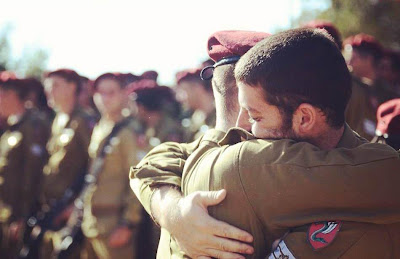Making Sense out of the Sharing the Burden Issue in
Israel
 |
| Photo courtesy of the Israel Defense Force Facebook page |
This is the first in a series of articles which will help
explain one of the issues confronting Israeli society, where the burden of
conscription falls to a great extent on the modern orthodox and secular members
of Israeli society, to the almost near exclusion of the ultra orthodox
community.
Israel, which has always been considered by the outside
world to be an egalitarian society, is beginning to cope with some inner
tensions and dissension as the issue of the inequality of the military service
burden takes the limelight in mini yet tangible expressions of social
discontent. The summer of 2011 was
known as the summer of discontent as tens of thousands of Israelis protested on
the weekends over financial and economic disparities within society. This summer, while the numbers of
protesters is noticeably smaller, the issues on the protester’s agendas now
include the near automatic deferment that a segment of the Israeli population
receives from military conscription, a duty enforced upon the majority of
Israelis aged 18 and above.
The deferred consist of two diverse communities within
Israeli society: the so called ultra
orthodox and the country’s
Arab citizens.
When the country was officially declared in May of 1948, an
immediate state of emergency existed because the neighboring Arab countries
attacked literally as the country was being founded, and military conscription
was a matter of national and personal survival. During Israel’s war of Independence, all able bodied Jewish
citizens were enlisted. In
retrospect, some of the period’s most poignant photos show bearded and secular
soldiers fighting side-by- side in their desperate and valiant military
campaigns.
Israel’s success in that war led to a lessening of tensions
until the country’s second war for survival broke out in 1956. Here again there was little difference
in conscription rates, although there was a negligible number of ultra orthodox
citizens who were granted military exemptions because they were yeshiva
students. At the time the subject
of Israeli Arab conscription was a non starter, questions of dual loyalty put
the issue beyond the realm of consideration.
By 1967, the ultra orthodox community through the growing
political power of its elected representatives, started exercising latitude in
claiming military service deferments, a process which continued unabated and
literally (figuratively) snowballed.
Today it is estimated that over 25% of the 18 – 21 year old population,
the majority of which made up of the ultra orthodox – find a way to avoid the
draft. And although there are indications that an increasing number of ultra
orthodox do enlist, on a percentage basis, the trend keeping them out of
military service is only growing.
Needless to say, there are growing numbers of passive
enlisted soldiers who are increasingly frustrated by what they see as a lack of
fairness in sharing the military defense burden in this country.
If you have an opinion and would like to share it with us,
please feel free to comment on this blog.
A follow up article will present a different perspective on this many
faceted issue.

No comments:
Post a Comment